|
| |
| |
| |
Portfolio/Slaves of Fashion
Bruce Benderson: Stories/Scott Neary: Illustrations
Preface to Slaves of Fashion
Here are three tales about the couture of guilt. They owe their inspiration to several 1950s magazines for ‘fashion enthusiasts’ that I discovered in a San Francisco bookstore. Masquerading as forums of the avant-garde in fashion, these magazines were actually designed to arouse fetishists. Readers were encouraged to write in with unusual fashion ideas.
In one issue a housewife has written about her fondness for latex ‘beauty masks’, which she wears for 48 hours at a time. On weekends her husband enjoys transforming her into other women by pasting paper features on the masks. Another woman sends in her picture: beneath the heavy veil, the face, bound in elastic, is barely visible. ‘If you are handicapped you can still make the best of what you have’ is the caption under a drawing of a one-legged woman in evening gown and crutches. And another monopede writes that she enjoys wearing one, pencil-thin, six-inch heel. There are long pedantic letters tracing the wearing of dresses by men in other cultures, or on the history of tatooing. Women drink cocktails through veils or at night transform themselves into ‘nylon moths’ by the artful selection of stockings and underwear...
Like the writers for fashion magazines of the same period, these writers are likely to find certain innovations in fashion ‘chic’, ‘voguish’, ‘smart’, ‘romantic’, or ‘classic’; but they are just as likely to find them ‘thrilling’, ‘breathtaking’, ‘fascinating’, ‘enslaving’, or ‘charming’. Only ‘enslaving’ hints at the actual experience. They are no less discrete when they refer to those who share their tastes as ‘correspondents’ or ‘various individuals’. An individual dressed to please is approached as an ‘enthusiast’, a ‘debutante’, or
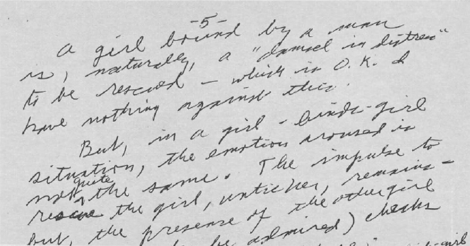
| |
| |
by the archaic terms ‘maiden’ and ‘damsel’.
Repression demands artfulness. Because of conditions of severe repression in the United States at this time, certain collective dreams achieved their most articulated form. It is amusing to see the over-formal, over-correct language of the fetishists as a kind of slang, meant only for those in the know. Long fingernails become ‘exquisitely’ or ‘excruciatingly bizarre’, shoes are ‘truly astounding’; there is a ‘wonderfully breathtaking contrast’ between a ‘smooth sheer stocking’ and the top of a thigh. A fragrance is ‘real delicate’, we are ‘most charmed’; we ‘simply fall in love’ with some shoes. Heels are ‘daringly long’, they are ‘fully seven inches’, or ‘nearly eight’. Because they are ‘unquestionably lovely’, we like her ‘very shapely little feet’. We belong to a ‘very select club of fashion enthusiasts’. Rubber is ‘delightfully fascinating’ because it is ‘a sufficiently thrilling achievement’.
The obsession with fashion is an alibi for darker, less acknowledged feelings. Alliteration is a way of evoking arousal without provoking censorship: ‘wasp-waists’, ‘taffeta tales’, ‘petticoat punishments’, ‘feminine fripperies’; or ‘fashion fantasies’, ‘articles of attire’, ‘modern maidens’, or ‘delightful duties’, which are ‘particularly provocative’. In contrast, the language of today's fetishists is dull, telegrammatic: ‘Rubber lover wants discipline. Greek or French action.’
The stories that I have written are also alibis, jokes about darker feelings, coded confessions. I hope they will rebel from attempts at interpretation by collapsing. Under scrutiny and stripped of their finery, my dreams become unintelligible, superficial, or embarrassing. Only in conflict, and only for a moment, does the language of eroticism achieve any aesthetic similarity.
Bruce Benderson
New York 1982
| |
Thrill Photos
H chose one.
She held the photo near the cone-shaded light bulb. Its glare further concealed the dissimulating pall of over-exposure. The picture had the nakedness of poor artifice, too.
‘A charming innocence...’ she called it.
She set the picture on the desk. The light bulb's glare made it almost invisible. H moved it a bit.
She squinted at the picture.
She liked the toe of the high-heeled boot, the way the point seemed to rest unconvincingly on the floor, and the way the front of its ankle nearly brushed the heel of the other - by a storkish contraction of the leg; while the unbuttoned skirt (so arranged to reveal the graceful curve of naked thigh) draped narrow folds over the leather encased calves; and the hips were creased by a wide, inflexible black belt. Concealed by the ranunculi, the head might actually have been looking out of the rear window rather than at the pages of the book.
Only certain ludicrous and mundane photographs from advertisements interested H. As a child she'd often cut out pictures of actresses and models from magazines and newspapers. Then, tracing the outline of their dresses with a scissors, careful not to destroy any detail of lace or applique, she tried to remove their dresses. She'd hoped to find, when lifting the paper dress, a body of paper, the grey breasts and
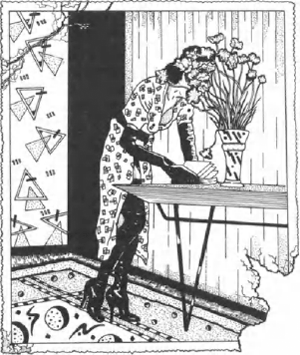
| |
| |
black nipples of the black-and-white photograph. Now, each time she cut and peeled a paper dress, peeling the body away into thin air, a wave traveled vertically through her own body. It was as if she were peeling away her own skin.
H moved to another photograph. In this one a woman in tight skirt and high black heels had been moving slowly up a staircase with her back to the viewer. Her wide-brimmed hat left her neck in shadow, and her own shadow was compressed against the adjoining wall. The shadow of the railing opposite her formed a black line broken into regular zig-zags by the ascending steps. One hand rested on her hips, and with the other she steadied herself against the wall. Indeed, there was a hollow, insubstantial quality to the image - owing partially perhaps to the height and thinness of the skyscraper heels, which made contact with the steps only at two tiny points on the page.
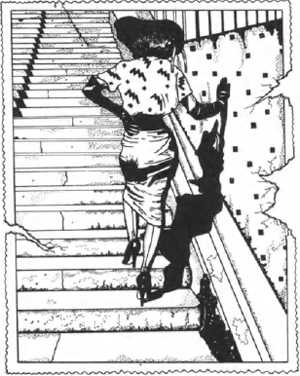
There were photographs which H carefully collected simply because they obsessed her for reasons that she could not understand... and more maddening that their appearance was upredictable, guileless, and in the most banal of circumstances. These black and white masterpieces, masquerading under the guise of the utilitarian or the disposable, had a power over her which seemed to increase with the monotony of their recurrences, when the photo was underexposed with just the right mixture of intention and inattention, when the model artlessly betrayed her own needs - or moreover - moved in the opposite direction - her identity drowning in her pose.
‘How thrilling, being blindfolded! Enviable and truly feminine.’
Though her head was tilted against the receiver, H did not answer.
‘Are you there?’ V's voice hissed through the receiver. ‘I've often confessed to a great fondness for it. When I was carried over the threshold for the first time I was tightly blindfolded and saw the house from top to bottom through my fingers.’
But H had already fallen asleep, the receiver on the pillow next to her, and the phone cord lying across her neck.
She woke up and removed her sleep mask with difficulty. The sharp light at the dressing table stung her eyes. She set the picture on the desk and tried to fathom its purpose. A model, advertising a household object, held it before her face, aping uncomplicated delight.
Handling the barber shears surgically she brought its point toward the corner of the photograph. The gleaming edge of the scissors would caress the crease of the model's gloves. It slid into the burning paper with a dry, pulverizing sound. H's thighs creased together as the scissors closed in one hand. The paper fell away leaving just an oval border around the model. Disconnected from its setting, the model's pose was even more compelling.
The idea of a conspiracy involving models posing for easily reproduced photographs that left no traces of evidence obsessed her more and more. The models were easy enough to buy off, and in imitating actions and feelings to which they had no connection there were great possibilities of control.
H languidly peeled a stocking from one raised foot. The thing fell away like a faint outline of her leg. She let it float to the ground. Once undressed she put on a sheer grey nightgown.
| |
| |
Caressing the scissors, she brought its point carefully toward the pulp image. The model's face was frozen in a meaningless smile. She held the thing toward the cone-shaded light bulb and began to cut. After she had traced the outline of the body she began to dissect it with the scissors, and suddenly it came alive. Like a snail, which one moment appearing lifeless suddenly issues from its shell, the paper began to ooze.
She removed the arms with the scissors, they seemed to quiver in her fingers like caterpillars; and she held a tiny paper thigh in the palm of her hand, which, like the heart of a freshly killed fish, continued for a moment its independent pulsations. It was only when the fingers were snapped at the joints, the nose cut in half, and the arms cut beneath the elbow and above the wrist that the thing became paper again.
H went on and on in a strangely obsessive manner, making this and other confessions to the man lying in bed next to her while simultaneously relishing their details. There was, for instance, the man she had met in the city, noted for his durability. He'd pressed her to such extremes that night she'd suffered fits of vertigo all the next day.
Or the one who liked her to describe every detail of applying her makeup. She sat at the dressing table before a large mirror, carefully mixing the thick base she would later apply to her face, to hide the marks it had already received that evening.
Jars of powder, creams or vials of perfume were spread out before her in a loose semicircle. She spoke slowly, watching herself in the large mirror.
‘Just scissors, but then the model's face's got to be concealed. Otherwise the whole effect is ruined.’
‘I'm certain of it. They use a polaroid camera. No evidence whatsoever.’
She rang for Therese. ‘Bring me the package I sent for!’
The maid returned with a small tube of face mask. A sentence on the back of the tube caught H's attention: Watch its shrinkage effect without speech or movement.
H spread the semitransparent liquid over her features. Then she sat motionless at the dressing table reflected in the mirror. On her lap and on the table (among jars of cream, boxes of powder, and vials of perfume) were cut-outs of figures of models. In conventional poses of mystery they were advertising utilitarian objects. With one hand H touched the scissors resting on the glass surface of the table. With the other she raised one of the cut-outs close to her face. Then she set the figure down and began to remove the mask.
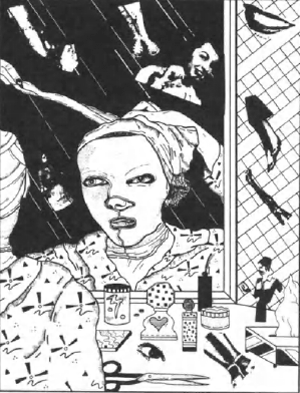
H told the man lying next to her that she had a fascination for all masks, and rarely retired without a sleep shade to keep out the light. This predilection stemmed from early adolescence when, because of a skin infection, the doctor had told her she would never be able to use cosmetics again. To make matters worse he had given her a sickly yellow salve which she had had to wear all over her face. Soon after, the idea came to her of wearing a loose white cotton sock over her face which could be secured and kept smooth by an elastic band around the neck. She raised it only to eat or drink until the infection had been cured.
Grasping the edges of the rubber mask with her fingertips while simultaneously trying to keep her chin away from her neck, H leaned
| |
| |
forward. From the side she gave the impression of being about to drop the loosening mask in her lap. Bent over the paper figures, with the mask adhering to her hands, she revealed her face, whose skin's fluorescence in the uncompromising light at the dressing table seemed the same color as the peeling rubber. There was, then, only the illusion that she was trying to peel off her own features.
In fact, the cut-outs of paper photos showing models posed to falsify already specious emotions had begun to interest her more and more. If they themselves did not participate in emotions which the rest of us were simulating when we did not know that we were, then there were great possibilities for profit and control. She kept the photos with her constantly, never losing her sense of amusement over their commonness and easy availability. Thousands were scattered about the room. They were spread all over the floor, the bed, and the dressing table, as well as in her lap.
He walked toward her with the scissors, saying it would be fun to cut out paper eyes and lips and paste them on the blank face created by a tightly secured cotton stocking. As time went on, however, she desired a greater sense of restriction and pressure around her face. First, a folded handkerchief was pushed into her mouth and her lips were sealed with a wide piece of adhesive tape. Then a pad of cotton was taped over each eye. A length of fleshcolored jersey cloth was wound tightly around her head, pressing the nose flatly against the cheekbone and drawing the mouth painfully apart in a kind of grimace. Over this was fastened a finely woven black silk stocking. With the features flattened out of sight the face became a shiny black oval. She could hear, but all she could see were large shadows.
She sat at the dressing table, lost in thought, as her reflection hovered before her in the mirror. In the harsh, flat light, she formed a fertile, opaque image with the newly created black and grey figures spread out on her lap. She bent toward them, lifted the mask away from her face, splaying her fingers so that the rubber stretched and separated into long strands.
She told him about the party they'd gone to, she in a long black dress underneath which her legs were encased in a narrow ankle-length petticoat only a little wider than a trouser leg. Beeswax had been placed in her ears as well as the usual cotton. And her head had been locked in the leather featureless mask with the zipper mouth.
As the mirror darkened the hardened rubber detached itself from her face and the image peeled with it, as mask of flickering light which adhered to her fingers. She remembered that sensation - the pressure of the last turns of elastic around her forehead, eyes and throat when her features seemed to be spewing forth from her face into another dimension.
Among the black and white cut-outs, a transparant image attached to her fingertips was projected more than three feet from her head. It was a grey twodimensional thing. At intervals a white flash burst from it that dropped sparks in her lap. The mask hovered on her fingertips, concave, a hemisphere of grey or yellow light like a convergence of bees on the nodule of a branch forming a negative image of a face. She held it at arm's length and carefully made it up while she ignored the mirror. The lips were brushed with an oily purplish black, a grey shading was added to the cheeks and burning white to the eyeballs. The image hovered a moment before the mirror and then dropped into her lap like ad dead ash...
But what else can be said about her? It's like trying to describe an overexposed snapshot of an unknown model who - perhaps desperate for a small sum of money - has blankly surrendered her oval face to the concave circle of some exploding flash guard.
| |
| |
| |
The Black Boxes Alibi
I think the doctor thinks I did it. But I'm no murderer - I'm a window trimmer.
For instance, I know that the mannikins' eyes should never meet. Nor look at the merchandise. That would spoil the display. The arrangement of arms, legs, heads has to hint at something ‘offstage’, something that can't be seen by anyone. When the mannikins ignore the merchandise, you can't help being drawn to it. It's the unknown object towards which the mannikins seem to be looking that gives the display its power over the minds of shoppers. But that's exactly what began to fill me with fear.
As an example, the display I built with invisible wires to highlight a pair of gloves: I pushed the mannikin onto the tips of its toes; the head arches backwards, away from one outstretched arm, while a glove and a bottle of perfume drop from the hand... I copied the pose from an advertisement for a mystery film showing a woman being strangled in her dressing room.
At the trial they used a photo of the display against me... used other photos and H's testimony: H, who lied and said I was found near the body right after the murder, who denied that she'd planted the murder weapons on me: a dark-colored glove, a shiny pin they said went right through the eardrum to the brain: before she called the police.
Glints from the doctor's glasses are making my eyelids flutter, black boxes are starting to pile up one within the other. I wish the doctor would stop that steam heat. I can't hear her. That hissing noise gets inside my ears. It grinds up every thought into black dots. Now light is spitting out of the dots like pins, everything is going to be shut off suddenly, as if by a switch -
The doctor says I'm not going to faint, that I'm remembering things in a half-waking, halfdreaming state: ‘Things you normally can't or don't want to remember.’ That my fall into the spitting black spots is just the normal process of falling into sleep. But the second before unconsciousness is more horrible than any memory, Doctor. And far worse than any daydream or nightmare. A dreadful logic seems to take over, and incidents that have nothing to do with each other creep together into accusations...
‘Maybe you're feeling the medication,’ suggests the doctor. She draws the heel of her shoe against the ankle of the other foot so that that hem is lifted slightly off the knee... and tilts her head to one shoulder... The doctor's mouth opens, closes, as she explains that I'm merely experiencing what's called a hypnogogic state, that the injection she gave me... But her voice can't really be made out, overlapped by the whisper of the radiator... which seems as if it's coming out of me.
‘It's your own breathing you're listening to.’
The doctor's voice tries to be reassuring, before it's ground up by jackhammers. And the air around it congeals into oval swellings... like white swells of skin creased by some tight material... Swellings around a red smiling mouth that glints like the ruby eye on H's barbaric arm bracelet...
In fact, H was smiling at me.
Her frail white knees swayed together, hinting of impatience... of too much to drink, especially with the shoe slipped off the heel of one foot.
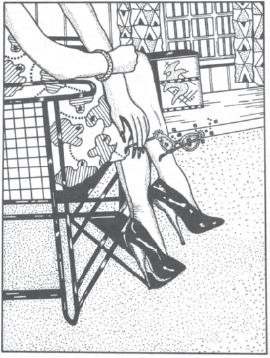
| |
| |
It hangs there like a black teardrop, oval and shiny.
H is smiling, explaining the difficulties in her marriage owing to her husband's illness. She has gotten into the habit of spending hours alone without telling anyone. Except for me, she tells me. She jabs at the shiny olive in her cocktail with her fingernails, while her black pinpricked pupils spiral into me like drills... or like long, glittering pins...
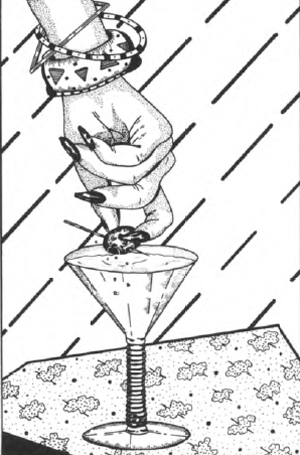
‘Sometimes I'm afraid I've used his sickness to buy my independence,’ she sighs, ‘used it as an excuse for a career as a fashion designer.’
Her husband is sitting across the large room. His eyes are focused on the tiny plaque on his lap. He is holding a sharp stylus, absorbed in his miniature engraving of his wife. He looks up. The look hangs between us in midair... until the head sinks down again... While H holds the pose that he has suggested for her, and the hem of her dress begins to creep above her knee.
Clamped between two darkened fingernails, an olive gleams, disappears. Ice clinks. She takes a sip of her fourth drink. A quiver runs through her husband's body. The stylus drops out of his hand... Had he been listening...? She gets up, picks up the stylus, puts it back in her husband's hand, sits down again. Clutching a pencil in a thin hand half-obscured by a large ring, she continues to speak in the same amiable tone about the gloves she's designed, the ones I'm to display, my reason for being here.
Their living room is filled with her sketches: gloves for all occasions. And with his work: hundreds of tiny miniatures of H.
The hand with the darkened fingernails picks up the cocktail glass... sets it down... lights a cigarette... Slowly the face unfocuses in a screen of smoke. The glass rises into the smoke, disappears. The ice clinks... The uninterrupted whisper of steam heat changes the walls to a powder that seems to float in the air. On the powder, H's designs and the miniatures of her etched by her husband are quivering... in the smoke.
She stands up. What has her husband asked for? Her cotton hands flutter above his head. She takes the engraving from his lap and sets it on the table. Her voice gets louder as she moves towards the dressing room. What is the reason for her sudden excitement?
You ask me what she's saying, Doctor...?
It would only bore you, it would only sound so very banal to you... since it's just a conversation about fashion:
small talk about the problem of falling asleep...
There's really no substitute for a good night's sleep or afternoon beauty rest, is there? And it's clear that modern life is making it harder and harder to ‘get away from it all’, don't you agree? Perhaps the use of a sleep mask... after all, it's safer than prescription drugs. And it's certainly less expensive than hours spent on a psychiatrist's couch... please don't take offense... To be blindfolded during sleep is astonishingly... refreshing and...
To be perfectly honest, sleep is becoming more and more of a problem for me. As soon as the lights are turned off all at once by the master switch in this wing everyone is plunged into utter blackness. I lie on my cot listening to the others' snores. The cell is blacker than the
| |
| |
inside of a camera. Then the floor falls away, but I'm only sinking into another sort of room, deeper, blacker... a black box... And inside it is another, and another... until an enormous stab of light, too bright to make out the figures it reveals, clubs me into unconsciousness. When I first wake up I don't know whether I've passed out or fallen asleep. I can't move my arms or legs, my lips are stuck to my teeth. The overhead lights are two white coals sitting on my eyes. You're bending over my cot, Doctor, just a pink shape, shiny pearls, a blurred oval of a face. The mirror with the hole in it over your eye is like a long tunnel... black boxes piling up... black sparks into which I start to fall all over again...
In fact, these fainting fits got so bad that H's husband suggested I stop visiting them... I'd fainted more than once in front of other guests - I couldn't remember anything when I woke up... But I kept coming back to see them, maybe because H said she sympathized. She too sometimes found it hard to get her breath, to keep her balance, she would tell me - as she mixed me a cocktail and handed it to me and watched me drink it with the same concentration that she designed the long dark gloves... until the glittering pin in her red hair made me squint, hurt my eyes... Why didn't the police question H about the ingredients in her cocktails, I keep wondering... What I didn't tell the police is that they - H and her husband - asked some of us to pose for photos... just as a party game. The same ones they used in court... And sometimes, when I looked at a photo that had been taken, for which I couldn't remember posing - I often couldn't remember what happened before I fainted - no one wanted to say whether the pose was real or faked. Could I really have been doing that? I asked. H let out a loud laugh... and her eyes were like dull pebbles...
That phone's ringing, Doctor. Why don't you answer it? The black phone on your desk is ringing and you're not answering it. Pick it up. Shiny, black, that phone continues to ring in a sleepless room. A room that I'd never been in with all the lights turned off... H's husband said I'd fainted, and because they were afraid to let me go home alone, they put me on the sofa in the room with all the etchings and tiny engravings. And they turned out all the lights... and left me alone for what seemed like hours, until I held two cushions against my ears, to get away from the white hiss of the steam heat. And then suddenly the phone rang, Doctor - would you please answer that phone! I noiselessly edged the receiver off the hook and I pressed it to my cheek... but there was no voice... nothing. Only a tiny rubbing sound - or was it breathing? Yes, breathing - complicated by an occasional thud or squeak... like the noise of H's husband's rubber-tipped crutch on the marble floor of her dressing room. Yes, that's it: thuds... squeaks... a pause... more of them. And the breathing was interrupted by one sharp, quick moan, after which it started again faster... laced with the powdery whisper of the radiator. While the thuds and squeaks grew faster, louder... Then quieter... after which they suddenly grew louder again.
It was her husband making his way back and forth between the telephone and some other point, with that painful walk of his... bringing her pieces of clothing or a hairbrush, I imagine. She'd said it that night in a low voice: ‘He just doesn't feel useful anymore. Sometimes I ask him to help me get dressed, just to make him think that he is...’ That sideways swing of the hip that seems as if it's going to dislocate the thigh from the socket at each step... I must admit that the thought of H's husband's disability intrigues me. What exactly would it look like if revealed? At times the leg jerks sideways in its socket, so suddenly that it would be impossible to move at all without a crutch, at other times the outward twist of the pelvis is not enough to inhibit forward movement seriously, the walk looks almost normal... except for that horrible squeaking... Only the sound of the guard's rubber-soled shoes on the tiled floor, you say?
Then what about that conversation? Soon it will begin all over again. The talk about the eye bandage - or sleep mask - or blindfold, whatever she first called it - worn to induce sleep: which is effective, but not nearly so much as one that deadens all sound, too. It is as if a familiar story were unfolding itself almost automatically. ‘...it being clear that the fast pace
| |
| |
of modern life is making it impossible to “get away from it all...”’ Had she really admitted to a certain pleasure in being blindfolded? Perhaps. It was safer and cheaper than prescription drugs or hours spent on the psychiatrist's couch... Through the thick smoke her features could barely be made out. The face looked like a blurred moon... Maybe there was no face, merely a dark space under the swollen coils of hair...
I'll show you what it looked like. Give me those scissors, the points are blunt - I couldn't possibly hurt anyone with those. Let me have that ladies' magazine over there...
You take a model advertising a common household product, like this one... And you cut away the face... no, you cut away everything else, instead, like this... the product, all the words, the setting. And you lay the figure on this black table. Like this. Her smile is horribly compelling, isn't it? Now you don't know why she's smiling like that, do you? In imitating emotions - feelings that the rest of us are simulating when we don't even know that we are - she has at her fingertips enormous opportunities for control. And, if I could only harness that power... Look at the smile and imagine it multiplying, over the table, the floor... my lap -
That light again! Only the reflection from your glasses? Take them off, if you don't mind.
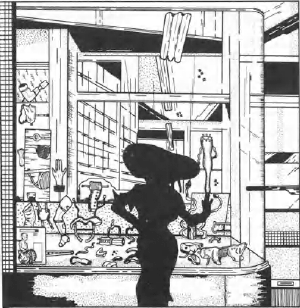
See what you've done? You've made me nip off part of the model's left leg. That's the one H's husband was having trouble with when he first asked me to visit the warehouse of the surgical supply company where he bought his brace. No, I didn't want to stay in there... when it was decided that the cloth brace H's husband wore as an aid to a deformed pelvis would be exchanged for another, one that offered more support. This new brace prevented the possibility of the hip dislocating, but it had one unfortunate drawback. It transformed his barely noticeable limp into an exaggerated turnout, created a constant and severe pressure that bordered on the painful, even with the use of the crutch.
I saw no reason to tell the police everything that happened that night... when the engraving stylus dropped out of his hand, when he screwed up his face as if he were in pain. Then she went into the dressing room with the muffling curtains to get his medicine and took me with her so that I could see the larger paintings he'd made of her... and sank into the cushioned love seat... explaining that I'd misunderstood, none of the paintings were in this room, I was to watch her posing for one instead... for which she began slowly preparing... covering her mouth with another layer of red lipstick, applying creams and rouges until the face looked like a rigid mask -
Don't put thoses glasses back on. And stop looking at your notes. No, I never said that, stop putting words into my mouth... claiming to be repeating exactly what I've told you. Your voice sounds rehearsed and insincere... Your head... well it isn't a face at all, but a blinding glare, a faceless oval...
Maybe I should tell the police - maybe I should tell you... how she described the pleasures of being blindfolded... reminding herself of the enormous tests of patience in learning to find her way about the house by the use of touch alone. That was after we went into her beige, silk-curtained dressing room filled with the suffocating frou frou of garments over which her soft insinuating voice could barely be heard, while her husband waited for his medicine and -
Absolutely not! That's not true: that I was never invited into the dressing room to see any paintings, that I let myself in when no one was
| |
| |
home, and waited for her in the mammoth wooden closet... until she and her husband came in to get ready for bed... clicking on the tiny nightlamp. And every object was softened into buzzing shadows, pulverized into tiny particles. And the sound of congealed breathing could be heard over the whisper of silk and the chatter of plastic bracelets. And her husband's voice croaked, ‘Are you almost ready,’ as he limped toward her...
Do your notes say, Doctor, that pinpricked pupils are drilling into me as I'm watching a skirt fastened about the ankles with a silk cord? That the tiered wig is being attached with a long golden pin to the real hair, which has been pulled back until the temples redden? and that a glove is slowly being pulled up an arm to drain it of color just as the bathrobe falls open and the horrible medical contraption attached to the hip and the thigh is suddenly revealed?
...that the phone rings, again... and that the receiver is placed on the dressing table so that whoever is on the other end can pick up every sound...
... of the head being covered with a white stocking fastened at the neck, yards of the material wrapped tighter...
...a black rubber stocking pull over the bound features until the face suspended above the chair looks like
a blank oval, a giant olive...
black, shiny... breath escaping like steam from a broken radiator.
And black boxes are spilling out of your glasses... one within the other, and gasps can be hear coming from the shiny oval, while the figure is straining upright, too upright on the chair. When someone limps forward, it is not to H, to help her, but to me instead, who is sinking rapidly into blackness.
| |
Exposed
Around midnight I can still hear their voices. As clear now as they were twenty years ago. Talking about me in the next room, after they've put me to bed. Talking about me as if I were still a little boy.
Where is he? says Mr. D.
Sleeping, says Momma, I guess. How should I know?
They've just done it or are about to do it or are thinking about it. A young Mr. D is rubbing dry nervous hands together, and the thought of his hands won't let me eat the chocolate he gave me before she tucks me in.
How do you know he's asleep?
He's asleep.
He could be pretending to be asleep. He doesn't play it straight. He's secretive. Kept that piece of chocolate closed in his hand the whole time you were putting him to bed.
Don't worry about it.
But what if he came out then, the kid?
He won't.
But it never happened?
Not that I know of, says Momma.
It never happened. It never will happen. You'd say she was innocent, Mr. D is saying to the police, but it couldn't have happened without her. Still you'd say she was innocent. Just petty thefts is all. ‘Borrowings.’ Didn't amount to much. For someone like her being found out would have meant the world. She couldn't have faced the kid. She never wanted to work. But she couldn't live on that small pension. Got a job at the perfume counter. They all hated her at first. Knew how to pronounce all the French names. Then she learned photography.
Mr. D eases into a smug smile. He taps some tobacco out of his pouch into his pipe. There were a lot of girls like her floating around, he says. Easy marks, lonely or jumpy. Scared, you could hit them up if you wanted to. Yes, I remember her. Fits of jealousy, nightmares. Yes, I remember her. She'd almost died from the bottle...
Momma's eyes drained pale. They watered and sparkled. She poured some wine from the cocktail pitcher and took a sip. She rose from the cushioned chair with a sigh. She took off the dressing gown she'd put over her black dress to do her makeup and began to pull on her gloves. These are so long and tight she must request my help getting them on, pushing each of her
| |
| |
fingers through the tiny openings. Then Momma slips the strap of her black camera over her head. She puts on her black hat. Lifting her veil away from her face, she bends to kiss me as the camera bounces lightly against her breasts, its flashguard glittering in my eyes.
She was a drab woman, says Mr. D. When it came to the kid her goodness was all absence.
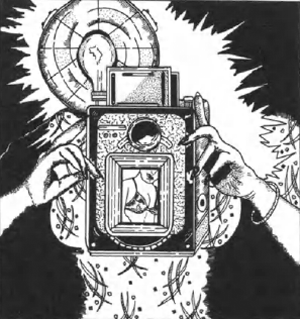
At 9.15 a.m. the watchman at the department store lets Momma in at the employees entrance. The store will open in 15 minutes, but most of the clerks have still not arrived for work. She wanders down an aisle of dust-laden boxes. Glass cases reflecting her arms, display mirrors reflecting her face. Past a row of hats propped on metal stands or a line of upside-down legs disconnected at the thighs, a series of stockings fading from pink to beige, each foot overlapping the ankle next to it
- past an empty jewelry display: plains of black velvet, tilted cylinders covered in black velvet, black velvet plateaus shaped like necks
- through the storeroom where the mannikins are kept: arms without hands, trunks without arms or heads
- to the dressing rooms that form a maze of roofless cubicles and out a door to the delivery alley. Momma walks to the entrance of the alley and opens another door with the key she wears around her neck. She steps, quickly, quietly, into a narrow corridor lit up by tiny red lights at long intervals. The corridor zigzags into a maze like the dressing rooms, because it is the negative image of them - the space between the dressing rooms and the outer wall of the building. She feels in the pocket of her black dress for a roll of film and snaps it into the camera.
Momma walks toward a small circle of yellow light in one of the walls. Peers through it: a woman reaching backwards to zip up a dress. Momma moves to the next circle of yellow light and peers through it: a woman removing a blouse. She peers into the next dressing room, and the next.
In dressing room 21, a woman is putting a blue cashmere sweater with a dangling price tag into a handbag.
Momma places the lens of her camera against the hole in the wall, adjusts the aperture, snaps a picture. She presses a button on her own side of the wall near the hole. Someone rushes down from security. The woman is arrested. Momma hands in the roll of film.
She was what you'd call a regular ‘china doll’, says Mr. D, when I first met her, skin like a sheet of paper. You were afraid she'd fall apart. But that was quite a few years ago. The kid took a lot out of her. I'm not saying that our seeing each other wasn't bad for the kid, I'm not even saying it was within the bounds of the law what we did together, but two adults in the privacy of their own homes, that's their business, long as it doesn't hurt anybody.
Still, the kid.
Momma in her slip is spread out against the living room chair, Mr. D standing over her. She seems as if she's asleep, or fainted.
What if he'd woke up, come out?
The child stands by the chair tugging at the sleeve of a limp arm.
Or found the stuff she kept in her drawer? I remember the time she caught him playing near that drawer. She was near hysterical. Had to beg off that evening. No dice.
The doorbell rang. Momma was still at the store. A very big lady in skyscraper heels stepped in. She was wearing too much makeup. Her
| |
| |
name was Olga, she said, she was a freelance model. She'd come about the advertisement in yesterday's paper: a photographer offering professional services to commercial models at very reasonable rates. She'd had trouble finding the address, Olga said, it being in such a deserted part of town.
She followed me upstairs to our attic, the maze of beams and partitions that Momma had converted into a photography studio and laboratory for processing film. Olga sat down in a french provincial chair. Momma's assignment, she said, would be to photograph her in scanty clothing, identical to that worn by a model holding a famous product in a magazine. In this case - however - there would be no product.
Momma came up to the attic. As usual her grayish fingers had been discolored in several places by contact with burning flashbulbs. She plunged them into the black folds of her smock.
I went downstairs and started cutting out my paper dolls - pictures of models from magazines. I named one of them ‘Olga’.
A convex disk appears around a corner, trapping me in a sudden flash of light. The fingers of both hands whiten around the retreating flashguard,
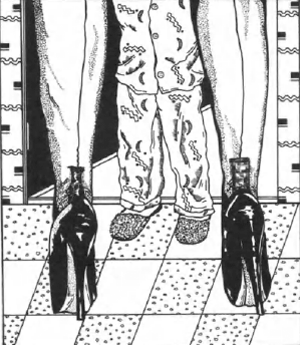
before the hands disappear once more inside the folds of black muslin. A rigid silence spreads throughout the room. But I'm only taking your picture, dear, says Momma, for your birthday. You musn't get so upset. Now blow out the candles and I'll cut the cake. Then kiss Mr. D goodnight and climb into bed.
Nervous as a colt, says Mr. D. An overactive imagination.
There are voices coming from the other room, muffled moans. Did Mr. D call Momma ‘Olga’? It was a hollow voice that chilled me to the bone.
Semi-dressed, a young matron in the act of switching the price tag from one article of clothing to another is caught by a flesh of light. Momma lets go of her camera and the flashguard bounces against her breasts. Her finger darts from the black folds of muslin to the button that will alert security. But she stops: an eye is pressed against the hole, peering at her in the glint of red light. Then a voice sobs like a trapped animal before it is able to begin speaking: she is not a woman in need of money, clothes. If this habit of thrill-seeking through the theft of inconsequential merchandise were to be revealed, it would mean the ruin of her entire life. She is an important woman in this town. And has a reputation to protect. The woman rolls some large bills into a tube and threads it through the peephole, begging Momma to reassure her that she will accidently expose the film...
Momma is telling the story to Mr. D.
In a town like this you gotta be careful, says Mr. D. He is holding something - a roll of film? - between thumb and forefinger. He slips it into his pocket just as I enter the room.
Why the long face, dear? says Momma, it's just a story I read, there's no reason to be upset. What happens next? I'm not certain, it's not clear, oh maybe I haven't read that far.
Overactive imagination, mumbles Mr. D.
Why does the paper doll change when she is cut out? When I cut away the product, when I cut away the setting, the same smile seems dif- | |
| |
ferent, the scanty clothing she is wearing takes on a different meaning.
Why is the paper doll Olga smiling? In imitating actions and feelings to which one has no connection, emotions that others are simulating when they do not even know what they are, there are great possibilities for control.
I set Olga on the table. I cut off her dress to find out what was underneath. In cutting away the dress I had cut away Olga. There was nothing there. I taped it back together.
I had to shadow her all day, I hear Momma saying to Mr. D in the kitchen. She kept moving from one tryon room to another.
I cut out the paper doll called ‘Momma’ and tape her feet to Olga's feet so that she will shadow her all day long.
The grayish, discolored fingers extract a photograph from the large portfolio and lay it out on the kitchen table under the light.
Don't you recognize yourself? she says. It's you. I took it on your birthday.
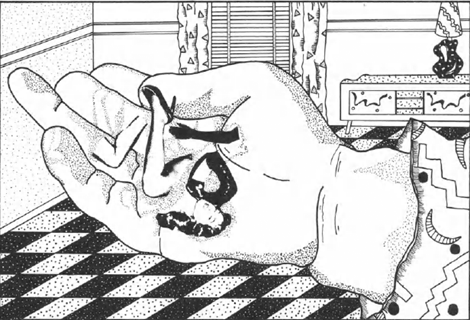
I carry the glossy picture into my room. I cut away the kitchen table. I cut away the comer of the window sill above me head. I cut away the wall, the floor, everything else.
Now it looks like me.
In the red-lit corridor between the fitting rooms and the wall, Momma opened the camera. She took out the finished roll of film and slipped it into her pocket. She took another roll of film from a package that had been opened and then resealed and she reloaded the camera. She snapped the camera shut and began winding the film through it. She came out at the delivery alley and walked through the fitting rooms to security. She opened the camera, took out the roll of film, handed it to the security officer.
You won't find anything worth keeping today, she said. It's not worth running it through the lab. The security officer opened a metal box with a key and placed the roll of film inside.
Momma put on her coat and walked out the employees entrance. She walked quickly, looking behind her several times, one hand clutching the roll of film in her pocket.
| |
| |
Mr. D's face turned livid. He dropped the tobacco pouch as he leapt at me: He doesn't know anything! It's all in his mind! An overactive imagination!
The police had to grab hold of him.
On the telephone a singsong female voice punctuated by fits of coughing: Just tell her I have the money, and I want those pictures today!
She hangs up.
You're just telling me a story, says Momma. Something you read in a book. No one called. Now go to bed. From my bed I can hear the doorbell ringing. Is it the singsong voice? Only Mr. D? I dream he is calling Momma Olga, and she is answering, commanding, in a cruel voice.
The maze of beams and partitions in our attic that Momma had converted into her photography studio look like fitting rooms. Perhaps that's what makes the woman with the singsong voice - who says she's a model but doesn't look like one, and who's wearing expensive-looking sunglasses - so nervous. She sits rocking back and forth in her chair, waiting for Momma. Her freckles fade in and out of her pale skin, lost at moments in the screen of smoke from her cigarette.
Momma gets home from work. The woman removes the dark glasses to look at her. Eyes like black circles, the eyes of a trapped animal. Momma plunges discolored fingers into the pocket of her black dress.
I go downstairs and unstick the paper doll Momma from the paper doll Olga. Then I cut out another paper doll named Singsong and stick Momma's feet to hers.
A series of photos are fanned out on the living room table like a hand of cards. A fat, watery-eyed man briefly strokes the corner of the first with the side of a stubby thumb. I'll take this one, he says. I like this one. Momma slides it away from the others and marks it with a grease pencil. She sends me into my room. Instead of playing with my paper dolls I try to decide whose picture the man has chosen. Olga? Or the woman with the singsong voice?
Perhaps it is Singsong, stuffing an article of clothing into her handbag.
More and more the photography studio in our attic is beginning to resemble the try-on rooms. Now there are peepholes in each of the cubicles' walls. Momma is in the attic with the watery-eyed man, showing him photos, while I am downstairs with my paper dolls. These I call my paper dolls, I pretend I hear her say, who will do exactly what you want them to do - if I tell them to.
The fat man will purse into a smile.
Through one of the peepholes, the fat man is watching a freckled woman in underwear. She is stuffing several pairs of stockings into a handbag. The fat man pulls aside the partition. The freckled woman gasps with fear. Very good, he says. I've always had a great fondness for stockings. And your lovely limbs are the substance which makes their perfect form come to life. Would you mind unrolling one of yours?
Raising one foot, she peels off the nylon. It falls away like a faint outline of her leg.
Exquisite! Are you a model?
Olga stops rolling the stocking down her leg and gazes into the lens of Momma's camera, holding her pose. Honey, stop crying. Momma is saying to me. She's only pretending, she's just a model. See?
But I break free from Momma, run downstairs, take out my paper doll Olga and cut it to pieces with my scissors.
Suddenly the thing comes alive. The paper begins to ooze. I snip off the arms, which quiver in my fingers like caterpillars. I hold a tiny paper thigh in the palm of my hand, which like the heart of a freshly killed fish, continues for a moment its independent pulsations. Only when the fingers are snapped at the joints, only when the nose is cut in half, and the arms cut beneath the elbow and above the wrist does the thing become paper again.
Momma's models were called ‘paper dolls’, I hear myself telling the police, models posing for easily reproduced photographs - polaroids that left no traces of evidence. Mr. D is strug- | |
| |
gling against the grip of a policeman. He's crazy, he's shouting.
They'd find a man interested in paying the blackmail money for a woman who'd been caught red-handed, I hear myself saying, in exchange for the woman doing whatever the man wanted for an hour. But the real woman, the one who'd been caught stealing, she was paying her own blackmail money. The ones the men were paying for were just models.
He's gone completely bananas!
That doubled the profit, I go on saying. And often, the man got so excited by the whole idea, that he made her reenact some aspect of the crime for which she had supposedly been caught red-handed.
Through a glass partition, I can hear the social worker questioning the police. But the child, she keeps insisting, where was he?
Sleeping, I guess, says the detective. How should I know?
But I'm not sleeping, no, I'm watching Momma, or is it Olga, in the partition between the fitting rooms and the walls, at the store, moving from one peephole to another.
An eye penetrates like a drill from the red-lit corridor into each bright cubicle, freezing each image into a still picture. Until the walls of the fitting rooms fall apart to reveal an improvised photography studio, littered with empty boxes of film, chemicals, props...
While the eye in the peephole deadens, like a fish's unblinking eyes, or those of a blankly smiling model in a photograph, who holds a product to which she has no particular relation.
Bruce Benderson's film criticism has appeared in 1,000 Eyes and Mulch; his translations rom the French in Tri-Quarterly among others.
Scott Neary illustrated Ape Sandwich (Dutch edition Broodje Aap by Ethel Portnoy) a collection of modern horror tales. His work is published in Esquire Magazine, The Village Voice and The New York Times.
|
|